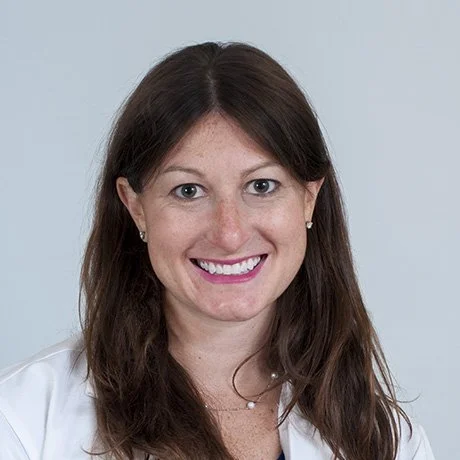Meet Dr. Rebecca Karp Leaf, Porphyria Expert
The porphyria community is lucky to be supported by dedicated physicians, researchers and advocates who work tirelessly to improve care and develop new treatments for porphyria. The United Porphyrias Association is pleased to introduce you to some of them!
“Patients help us do better research—you ask the questions that we need to answer!”
-Dr. Rebecca Karp Leaf
Please introduce yourself and tell us a bit about your connection to porphyria.
My name is Rebecca Karp Leaf and I am a classical hematologist- a blood doctor. I see patients with a variety of blood disorders and as hematologists we often are called to see patients with porphyria.
In 2019, Dr. Amy Dickey and I started the Porphyrias Center at Massachusetts General Hospital in Boston, where we now follow over 150 patients with a diagnosis of porphyria ranging from the acute hepatic porphyrias to the cutaneous porphyrias. Our center is also very involved in clinical and translational research. We have multiple clinical studies up and running and are very excited about new medications that have come into the clinic.
I also have a particular interest in reproductive health and women's health, and research the interaction between women's health and the porphyrias.
Can you tell us a bit more about the Mass General Porphyria Center? How did it get started, what advantages does a center like this have for patients?
Patients with porphyria were being cared for by a variety of doctors across New England—including by geneticists and hematologists. Unfortunately, some of these physicians retired or passed away and there was a real need for doctors who were familiar with porphyria. The division chief of hematology at MGH, Dr. David Kuter, had been following families with porphyria for decades, and with the approval of two new medications for porphyria, encouraged me and Dr. Dickey to formally establish the MGH Porphyria Center.
Once a month Dr. Dickey and I have clinic where we specifically see our porphyria patients. We also have a team of research coordinatorswho come to collect samples and consent patients for various ongoing studies. Dr. Dickey and I also have a team of other medical specialists that we can call upon if needed in the fields of kidney medicine, dermatology, neurology, etc.
You mentioned that you have a research interest in reproductive health, can you tell us more about your research in this area?
I'm interested in all aspects of the porphyrias. I think heme biosynthesis is fascinating and I just truly love working with our patients. It's been such a highlight in my career to really get to know the patients and be part of this community- it’s very rewarding.
I have a particular interest in the intersection between women’s health and hematology For instance, 90% of patients who are symptomatic from acute porphyria are women. and we often don’t know how to counsel patients about birth control options, pregnancy, menopause, and fertility treatments. There's a real dearth of information in that area.
This year we sent out a survey to patients with acute hepatic porphyria across the country and asked them to detail their experiences with contraceptives, pregnancy and fertility and menopause, trying to just get a bit more information about what people have experienced in the past. We found that progesterone-only formulations of contraceptives were associated with worsening symptoms, most women did very well during pregnancy and lactation, and that the perimenopausal period was associated with an increase of porphyria symptoms. The findings from the survey will help us better counsel patients about what to expect during these various life phases. The findings from the survey were presented at the International Porphyrias Symposium in October 2025, and I’ll be doing a presentation at the American Society for Hematology (ASH) meeting in December on this topic.
Is there any upcoming research or treatment news coming up that you’re particularly excited about?
In terms of women’s health, deepening our understanding and being able to better counsel women on options for safe and effective contraception, and managing the transition to menopause. I also hope that we are able to gather information on the safety of medications such as givosiran in pregnancy.
In general, I’m excited that there is a real interest in porphyria in the pharmaceutical and research community. There are several promising treatments in the pipeline!
Do you have anything you’d like to say to our patient community?
Always have a low threshold to reach out to your doctors. We love to hear how you're doing and to help if you’re experiencing new symptoms. Please don’t ever suffer alone. Also, patients help us do better research—patients ask the questions that we need to answer!
I also want to thank everybody who took time to participate in the reproductive health survey! We really appreciate your help!








